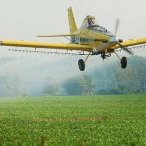
16 March 2012 | News | Water | Resisting neoliberalism | Human rights
This Should be a Priority
Effects of Agribusiness in Uruguay: presentation of short films
“The health of the land should be part of the agenda of the human health workers”, said on Wednesday in Montevideo, capital city of Uruguay, Argentinian Doctor Damian Verseñazzi, a professor of the School of Medicine at Rosario National University.
“It is unacceptable that the people responsible for health say the victims of agrotoxics should prove they are victims”, he said in an open activity organized by REDES-Friends of the Earth Uruguay and Programa Uruguay Sustentable. The environmentalist organization presented a report and two short films called "Collateral Effects: Testimonies of people affected by agribusiness in Uruguay – 2011”, at the Fine Arts School.
Around 150 people attended the launch of the latest report by REDES- FoE to listen to the presentations by Verseñazzi, Uruguayan doctor Mabel Burer, former Head of the Toxicology Department of the School of Medicine of the University of the Republic, and the testimonies of two people from areas affected by agrotoxics.
Soy in Uruguay has advanced rapidly and it now covers 1 million hectares. The arrival of sowing pools, Argentinian companies that arrived due to the tax opportunities provided by the country accelerated the land and production concentration process. This has to be added to the rapid development of forestry which also covers 1 million hectares, and the traditional rice activity, which are part of an agribusiness package that impacts local communities in particular, including their health.
“It is clear that the current model of agricultural development that predominates in Uruguay, considered the promoter of "rural modernity", implies several “collateral effects””, according to the press release issued by REDES- FoE for the activity. Among these effects, the organization highlights the concentration of production resources, the effects on the health of the rural population, their scarce development possibilities and the marginalization of a large part of family farmers, and the rural and suburban population in general.
“The public health system has serious weaknesses when diagnosing a series of new illnesses that affect the population directly impacted by the technological practices of agribusiness”, reads the press release.
The environmentalist organization developed the documentaries and Wednesday’s activity with the goal of drawing attention to the consequences of the model of agribusiness, including in health terms, for the relevant authorities to take responsibility. “The experts and the State have to provide an answer. It is sad that the people don’t see the State as an ally”, said scientific researcher Pablo Galeano, of REDES-FoE at the conference.
Marcelo Fagundez, of Guichon, Paysandu department, an area which is particularly affected by the advance of soy and forestry, denounced that they can’t rely on the authorities and don’t see actions by the State.
He also said that it is increasingly more common that the people of the area organize fundraising events to help their sick neighbors. Even though they can’t ensure it, they believe it is the agroindustry which is making them sick, and that’s why they demand the support of the State. “If the soy producers have the right to make huge profits, we have the right to defend our natural resources”, he said. That’s why he warned that water sources are being polluted with agrotoxics.
Meanwhile, Beatriz Pereira Das Neves, of Rincon de Valentines (Salto department) regretted that while she produces organic crops, “an airplane comes and sprays agrotoxics on them”. "If nobody protects the environment, our work as organic producers is in vane", she
added.
In an area where rice production is overwhelming the local population, the absence of the State is also the main feature. That’s why Beatriz requested support, “someone to listen and defend us”, because “airplanes continue spraying poison on our populations”.
Under the logic that the people affected are the ones who have to prove they were affected, instead of the agrichemical industry proving that their products are not harmful to human beings, the denunciations by the communities affected by agrotoxics are ignored or considered "groundless".
“We know that there is enough scientific information that proves that the exposure to pesticides during certain amount of time has impacts on human beings”, said Dr. Burger, who has been studying the issue for decades. Skin and respiratory diseases are the most common diseases suffered by the sprayed populations. “The government is the main actor. It’s unacceptable that airplanes continue spraying over schools or houses”, concluded Burger.
Photo: http://noticias-ambientales-cordoba...







